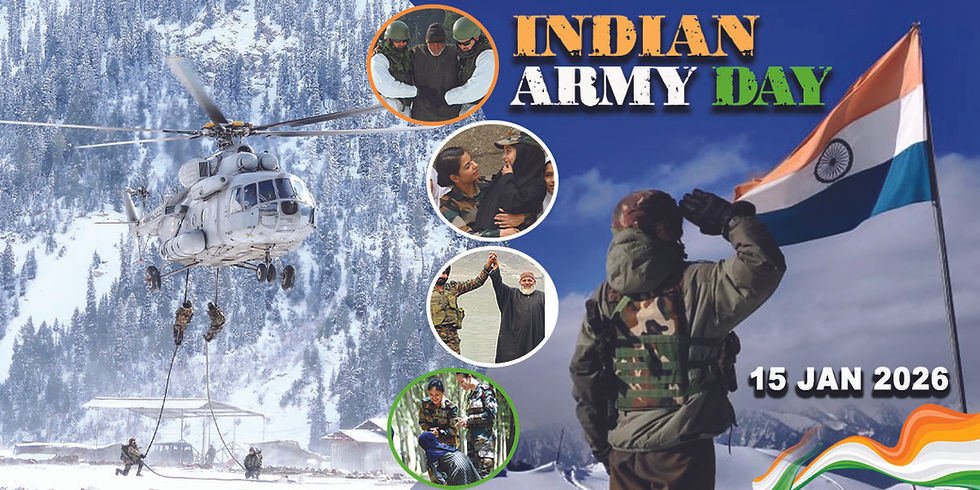ETHICAL OPS BY SECURITY FORCES - A CALL TO SURRENDER
- Soldier Stories Of Kashmir

- Feb 5, 2024
- 3 min read
In the soft glow of dawn, a transformation unfolded as security forces orchestrated their arrival, ushering in a new era-Ethical Ops. The rhythmic hum of vehicles reverberated through the city, setting the stage for an extraordinary approach to security. Clad in uniforms that spoke of discipline, armed with both weapons and a commitment to ethical conduct, the forces marched, signalling not just a physical presence but a profound change in their modus operandi.

The call to surrender echoed through the urban landscape, a distinctive plea for cooperation rather than confrontation. This was not the traditional, authoritarian demand for submission; it was a nuanced call that invited a surrender to a shared commitment to ethical standards. As the security forces strategically set up a perimeter, their demeanour conveyed a sense of responsibility and a pledge to safeguard not only lives but also the ethical principles essential for a just and compassionate society. Anticipation hung thick in the air as the city braced for an unprecedented display of Ethical Ops. The call to surrender, a phrase laden with historical connotations of defeat, carried a different weight this time-an invitation to choose a path of collective understanding over conflict. It marked a significant departure from the conventional narrative of surrender, emphasizing the transformative potential of yielding to a shared commitment to ethical standards. Taking their positions, a commanding officer stepped forward, embodying the ethos of Ethical Ops. His words were a powerful symphony, resonating through the city's alleys and boulevards. "We are not here to oppress but to protect," he declared. These were not empty words; they constituted a solemn oath to uphold the values that define a just and compassionate society. The call to surrender, in this context, was an invitation to lay down arms and embark on a collective journey towards peace and understanding.
Amidst palpable tension, the streets witnessed a unique spectacle-citizens cautiously emerging from their dwellings, drawn by the promise of ethical engagement. The act of surrender, once viewed as an admission of weakness, now bore the weight of wisdom-an acknowledgment that a shared commitment to ethical conduct could pave the way for harmonious coexistence. It was a surrender not to force but to a higher principle. Ethical Ops, as a concept, transcended mere tactical manoeuvres; it was a philosophy that permeated every aspect of the security forces' approach. Negotiations unfolded with a distinct emphasis on transparency and accountability. Each officer was adorned with a body camera, ensuring that every action was subjected to scrutiny and held to the highest ethical standards. This commitment to transparency became a cornerstone of the new approach, a pledge to maintain the integrity of ethical conduct in the face of complexity. The call to surrender resonated beyond the city centre, reaching even those who had long been on the fringes of conflict. It sparked a dialogue that surpassed traditional boundaries of confrontation. In community centres and public spaces, conversations flourished, laying the groundwork for a society that prioritized ethical values over the pursuit of power. The security forces, once perceived as enforcers of authority, metamorphosed into ambassadors of ethical conduct.The negotiations that unfolded were not mere transactions but exchanges grounded in empathy and understanding. Ethical Ops became a guiding force, shaping the contours of a society that recognized the intrinsic dignity of every individual. The call to surrender, instead of stifling dissent, encouraged open discourse and collaboration. It became a catalyst for change, inviting individuals and communities to embrace a shared responsibility for the well-being of all.
As the sun set on this historic day, the city stood as a testament to the transformative power of Ethical Ops. The call to surrender had not only diffused immediate tensions but had sown the seeds of a more just and compassionate society. The security forces, having demonstrated the effectiveness of ethical engagement, left behind a legacy that would resonate for generations to come-a legacy of principled strength, ethical resilience, and a commitment to building a world where surrendering meant embracing a higher standard of humanity







Comments